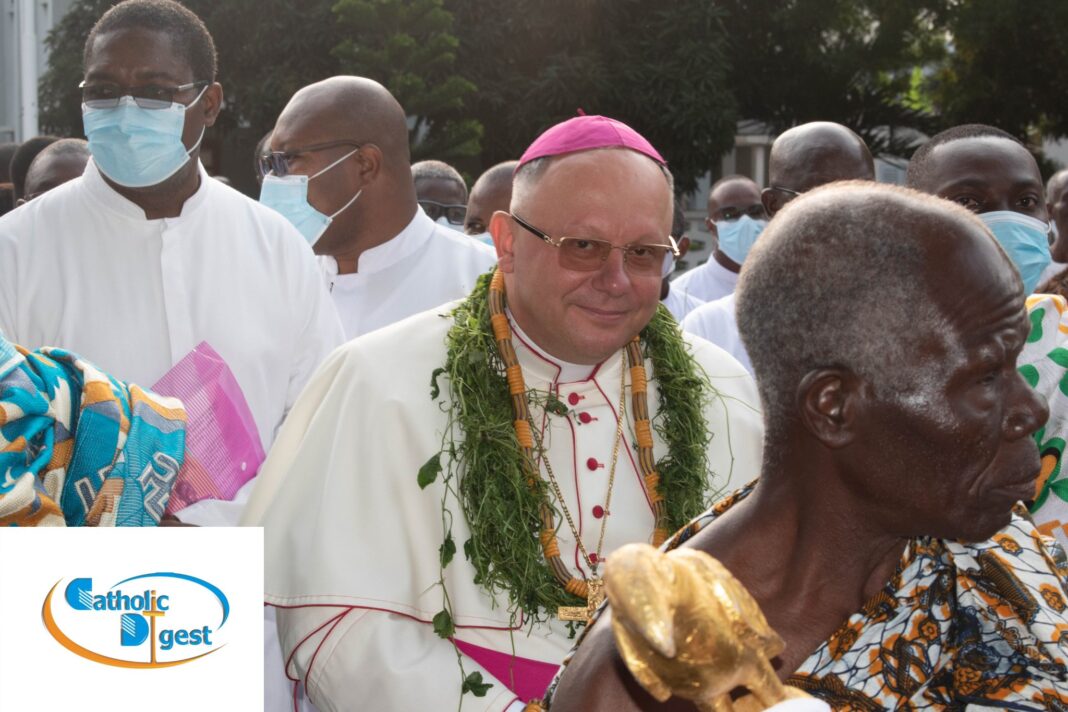The Archbishop of Accra, Most Rev. John Bonaventure Kwofie, together with all Priests, Religious, and a selected Lay Faithful of the Accra Archdiocese, will meet with the Apostolic Nuncio to Ghana, Most Rev. Henryk Mieczyslaw Jagodzinski today.
The meeting, scheduled for 10:30 a.m. at the Holy Spirit Cathedral in Adabraka-Accra, was announced in a letter signed by the Archbishop of Accra, Most Rev. John Bonaventure Kwofie, on February 11, 2023.
This comes just a week after a Catholic Trends Research Desk report indicated that Pope Francis was likely to name an Auxiliary Bishop for Ghana’s Catholic Archdiocese of Accra.
The letter, which was addressed to all Priests, Religious and Lay Faithful of the Archdiocese in part read “The Apostolic Nuncio to Ghana, His Excellency Henryk Mieczyslaw JAGODZINSKI, will be meeting all Priests, Religious and a cross-section of the lay faithful of the Archdiocese of Accra at the Holy Spirit Cathedral, Adabraka on Tuesday, February 14th at 11 am.”
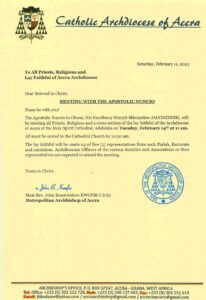
The development also follows a January 23, 2023, Catholic Trends prediction, which stated, among other things, that Pope Francis could appoint new Bishops for some Dioceses in Ghana based on [Can. 401 1.]
Tamale, Wa, Wiawso, Jasikan and Konongo-Mampong Archdiocese/Dioceses were in focus in that report.
Predictions and Papal Secrets
If you have read up to this point, kindly take time to read about these two concepts. The first is PREDICTION.
This, simply put, is a forecast of events likely to happen based on trends and seasons. (Basic dictionary check) For example, Can. 401 §1. of the Catholic Church states that “A diocesan bishop who has completed the seventy-fifth year of age is requested to present his resignation from office to the Supreme Pontiff, who will make provision after he has examined all the circumstances.”
What this means is that when a Bishop of a particular Diocese reaches the age of 75, what is next can be foretold.
The next concept is, PAPAL SECRECY
Papal Secrecy, also sometimes called Pontifical secrecy is a rule of confidentiality protecting sensitive information regarding the governance of the universal Church. It is similar to the “classified” or “confidential” status standard in companies or civil governments.
While the use of the English word “secret” in relation to Church documents and processes is often invoked dramatically, the term is actually taken from the Latin word “secreto,” which simply means “confidential.”
Materials covered by the pontifical secret include diplomatic communications made between the Vatican’s nunciatures around the world, but also apply to a range of other subjects. These include private dossiers and recommendations on priests and bishops being considered for promotion.
In judicial cases, the secret is meant to protect the privacy of victims, the good name of the accused (at least until they are convicted), and even the confidentiality of the accusers, who might be under the authority of someone under investigation.
It is important to note that Pope Francis abolished the pontifical secret in the case of sexual violence and the abuse of minors committed by members of the clergy. He has also decided to change the norm regarding the crime of child pornography by making the possession and dissemination of pornographic images of children under the age of 18 which fall under the category of delicta graviora – the most grave delicts. This is according to a 2019 Vatican News report.
Looking at the above explanation, a clear conclusion can be drawn that predictions are not the same as violating the Papal Secret codes. Again, not all cases enjoy the Papal Secret code as stated above.
In 2013, The Guardian tipped Ghana’s Cardinal Peter Turkson, Cardinal Marc Ouellet, then Prefect of the Congregation for Bishops, Cardinal Francis Arinze of Nigeria among others as possible candidates to be elected as pope following Pope Benedict XVI’s resignation.
Now to What our Analysis says;
Though the subject of the scheduled meeting for the Apostolic Nuncio to Ghana, Bishop, Priests, Religious as well as a section of the public remains undisclosed under the seal of Papal Secrecy, Catholic Trends is making a safe guess of what should be expected based on the Apostolic Nuncio’s visit to the Wiawso Diocese in January.
Observing the trends, our analysis points to the following;
1, Announcement of Auxiliary Bishop(s) for Accra.
2, Announcement of an Auxiliary and Coadjutor Bishops for Accra
3, Announcement of an Auxiliary Bishop, creation of a new Diocese and the appointment of a new Bishop for the newly created Diocese.
Who is an Auxiliary Bishop?
He is a bishop appointed to assist a Diocesan Bishop. Whether in a Diocese or Archdiocese. His title is Bishop.
The role of the Auxiliary Bishop is to assist the Diocesan Bishop in all matters related to the clergy, religious, and laity. He may help the bishop in his pastoral duties such as visiting parishes and attending to the spiritual needs of the people of the diocese. He may also help in the administrative affairs of the diocese such as budgeting, preparing reports, and overseeing financial and legal matters.
The auxiliary bishop is also, in a sense, a “deputy” bishop who has the same authority as the diocesan bishop. He shares the same responsibility for the spiritual, liturgical, and administrative activities of the diocese and is therefore expected to cooperate with the diocesan bishop in all matters.
He may be given the authority to ordain priests and confirm candidates, though this is usually done with the approval of the diocesan bishop.
Who is a Coadjutor Bishop?
He is a Bishop appointed to a Diocese or Archdiocese to assist a Diocesan Bishop. Unlike an Auxiliary Bishop, he has the right of succession, meaning that he automatically becomes the new bishop when the diocesan bishop retires or dies.
By canon law, he is also the Vicar General of the Diocese. In the case of an Archdiocese, he is called Coadjutor Archbishop instead of Coadjutor Bishop.
Who can be appointed a Bishop?
Can. 378 §1. In regard to the suitability of a candidate for the episcopacy, it is required that he is:
1/ outstanding in solid faith, good morals, piety, zeal for souls, wisdom, prudence, and human virtues, and endowed with other qualities which make him suitable to fulfil the office in question;
2/ of good reputation;
3/ at least thirty-five years old;
4/ ordained to the presbyterate for at least five years;
5/ in possession of a doctorate or at least a licentiate in sacred scripture, theology, or canon law from an institute of higher studies approved by the Apostolic See, or at least truly expert in the same disciplines.
- 2. The definitive judgment concerning the suitability of the one to be promoted pertains to the Apostolic See.
Who occupies these positions?
In terms of who qualifies to be a bishop, it is also important to note that individuals who may be in a position after meeting the predetermined qualifications may also have to have a certain profile and may have held some important positions in the administration of the Arch/diocese.
Having established that point, Catholic Trends analysis highlights that appointments made in Ghana have followed a consistent pattern over time under the Papacy of Pope Francis. Since his accession to the Papacy, this trend has seen Vicar Generals (in the case of Yendi Diocese), Cathedral Administrators (in the case of Wiawso Diocese), and the Pope’s preference to appoint Religious or Congregational priests as Bishops (in the case of Ho Diocese, Keta Akatsi, Donkorkrom Vicariate, and the current Archbishop of Accra) as Bishops.
This pattern suggests priests of the Archdiocese of Accra who could be appointed and based on this, Catholic Trends predicts the following names but not limited to;
Rev. Fr. Michael K. Mensah, Ph.D

Father has an interest in African Biblical Hermeneutics, African Christianity, and creative lay approaches to interpreting sacred texts.
He is engaged in developing new approaches to the teaching and learning of biblical languages on the African Continent.
Very Rev. Fr. John Kobina Louis, Ph.D
 Father is currently the Vicar General of the archdiocese of Accra. Very Rev. Fr. Dr. John Louis speaks English, Italian, Fanti, Twi, Ga and Hausa.
Father is currently the Vicar General of the archdiocese of Accra. Very Rev. Fr. Dr. John Louis speaks English, Italian, Fanti, Twi, Ga and Hausa.
Rev. Fr. Andrews Quaye-Foli, SVD
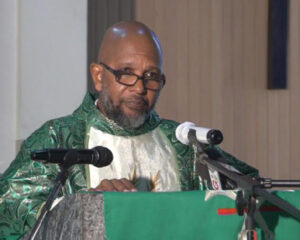
Father currently teaches at the St. Freinademetz House of Philosophy, Tamale.
Very Rev. Fr. Raymond Osei-Tutu, Ph.D
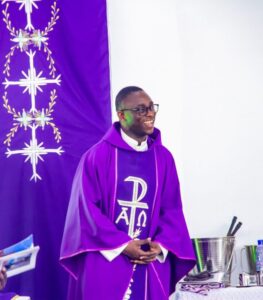
Father is currently the Chancellor of the Catholic Archdiocese of Accra.
Very Rev. Fr. Anthony Narh Asare
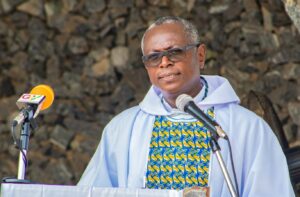
Father Asare is currently the Parish Priest of Ss. Anne and Joachim Parish, Teshie.
Why an Auxiliary Bishop(s) Coadjutor Bishop and a possible new Diocese in Accra?
Between 2002-2004, Then Rev. Fr. Kwofie, CSSp. became the provincial superior for the Spiritan Order in West Africa. From 2014 until 2019 he was the Bishop of Sekondi-Takoradi. On January 2, 2019, Pope Francis appointed him as Metropolitan Archbishop of Accra to replace Most. Rev. Charles G. Palmer-Buckle who had been appointed as the Metropolitan Archbishop of Cape Coast in 2018.
Most Rev. John Bonaventure Kwofie, CSSp, Catholic Archbishop of Accra
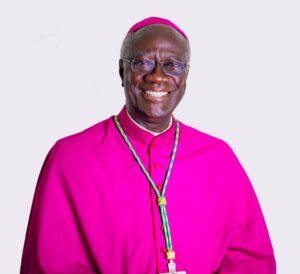
His Grace was installed as the Metropolitan Archbishop of Accra on March 1, 2019, at the Cathedral Church of the Holy Spirit, Accra.
Archbishop John Bonaventure Kwofie, CSSp. was however reported sick somewhere in 2021. On Thursday, June 10, 2021, he was said to have safely arrived back home in Ghana after a medical check-up in India.
A communique to all Priests, Religious and Laity of the Archdiocese, signed by the Vicar General of the Archdiocese, Rev. Fr. John K. Louis, said the Archbishop was “refreshed and healthy”.
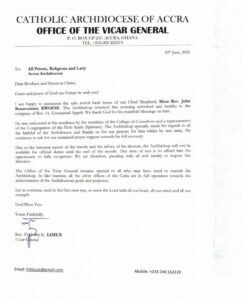
Since then, it was expected by many that Pope Francis will either get the Archbishop relieved of his duties on health grounds or give him assistance by way of appointing an Auxilary Bishop(s). Be that as it may, He has continued to Shepherd the Church in Accra dutifully for almost three years.
Another reason Catholic Trends is predicting Auxiliary Bishop(s), Coadjutor Bishop and a possible new Diocese for Accra is the size of the Metropolitan See.
The Catholic Archdiocese of Accra covers the Greater Accra Region as well as some parts of the Volta Region, which includes Accra and its surrounding areas.
The archdiocese’s extreme communities include Weija, Osu, Tema, Battor, and Vume, as well as Pokuase and Dodowa.
Because of the Archdiocese’s size, new deaneries were formed from existing deaneries. The former Tema-Battor deanery is notable among the deaneries that were divided into new deaneries, namely the Tema Deanery, Battor-Ada Deanery, and Ashaiman Deanery.
In December 2021, The office of the Archbishop in consultation with the council of priests and some other key college of consultors deemed it prudent to divide one of the largest Deaneries in the Archdiocese, the Tema-Battor Deanery into three. The new establishments became the Tema Deanery, Battor-Ada Deanery and Ashaiman Deanery.
What does the Canon Law Say?
Can. 403 §1. states that “When the pastoral needs of a diocese suggest it, one or more auxiliary bishops are to be appointed at the request of the diocesan bishop. An Auxiliary Bishop does not possess the right of succession.”
Subsection §2. notes that “In more serious circumstances, even of a personal nature, an auxiliary bishop provided with special faculties can be given to a diocesan bishop.”
The meeting points in the direction of what Catholic Trends analysis has shown. Barring any other happening, Catholic Trends expects an announcement that will bring joy to all.

